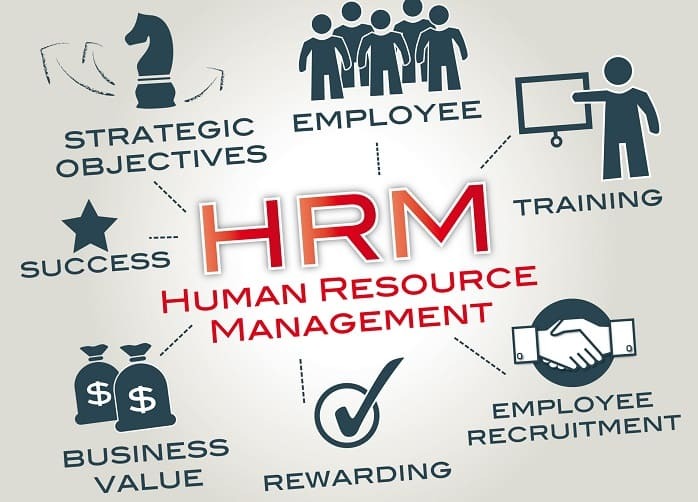
 Data Structure
Data Structure Networking
Networking RDBMS
RDBMS Operating System
Operating System Java
Java MS Excel
MS Excel iOS
iOS HTML
HTML CSS
CSS Android
Android Python
Python C Programming
C Programming C++
C++ C#
C# MongoDB
MongoDB MySQL
MySQL Javascript
Javascript PHP
PHP
- Selected Reading
- UPSC IAS Exams Notes
- Developer's Best Practices
- Questions and Answers
- Effective Resume Writing
- HR Interview Questions
- Computer Glossary
- Who is Who
What is the full form of HRD?
Introduction
Human Resource Development (HRD) refers to a strategic approach aimed at enhancing and improving the skills, knowledge, abilities, and overall performance of individuals within an organization. It encompasses various processes, programs, and initiatives designed to develop and nurture employees' potential, promote learning and growth, and create a positive work environment.

HRD involves activities such as training and development, performance management, career planning, talent management, succession planning, employee engagement, and organizational development. Its primary goal is to maximize the effectiveness and productivity of employees, ultimately contributing to the overall success and competitiveness of the organization.
Functions of HRD
The functions of HRD include
Training and Development HRD is responsible for identifying training needs, designing training programs, and facilitating learning opportunities to enhance employees' knowledge, skills, and abilities.
Performance Management HRD plays a crucial role in establishing performance management systems and processes. This involves setting performance goals, providing feedback and coaching, conducting performance evaluations, and recognizing and rewarding high performers.
Career Development HRD supports employees in their career growth and development by providing career planning resources, guidance on career paths, and opportunities for advancement.
Talent Management HRD is responsible for identifying and attracting top talent, as well as retaining and engaging existing employees. This involves developing recruitment and selection strategies, and work-life balance initiatives.
Succession Planning HRD plays a vital role in ensuring a smooth transition of key positions within the organization. This involves identifying potential successors for critical roles, and creating succession plans to ensure continuity and organizational stability.
Organizational Development HRD contributes to the overall development and effectiveness of the organization by facilitating organizational change initiatives, fostering a positive work culture, promoting diversity and inclusion, and implementing strategies to enhance employee engagement and satisfaction.
Employee Relations HRD plays a role in managing employee relations by addressing employee grievances, promoting a healthy work environment, and facilitating effective communication between employees and management.
Importance of HRD
HRD (Human Resources Development) is of paramount importance for organizations due to the following reasons
Employee Skill Enhancement HRD helps in improving the skills, knowledge, and abilities of employees. By providing training and development opportunities, employees can acquire new competencies and enhance existing ones.
Employee Engagement and Motivation HRD initiatives such as career development, performance management, and recognition programs contribute to employee engagement and motivation.
Organizational Adaptability and Innovation HRD facilitates organizational adaptability by promoting a culture of continuous learning and skill development.
Succession Planning and Talent Management HRD plays a critical role in identifying and developing future leaders within the organization through succession planning and talent management initiatives.
Employee Retention and Satisfaction HRD contributes to employee satisfaction and retention by providing opportunities for career advancement, professional growth, and personal development.
Enhanced Organizational Performance By investing in HRD, organizations can enhance overall performance. Skilled and motivated employees lead to improved productivity, higher quality of work, better customer service, and increased organizational effectiveness.
Employee Well-being and Work-Life Balance HRD initiatives can support employee well-being by promoting work-life balance, stress management, and employee wellness programs.
Challenges faced by HRD
HRD (Human Resources Development) faces various challenges like
Budget Constraints Limited financial resources can pose a challenge for HRD initiatives. Training programs, talent development activities, and implementation of technology-based learning solutions often require significant investments.
Rapid Technological Advancements Technology is evolving at a rapid pace, and HRD must keep up with the latest tools and platforms for effective training and development.

Changing Workforce Demographics Organizations today have a diverse workforce comprising employees from different generations, cultural backgrounds, and skill sets. HRD faces the challenge of developing programs and initiatives that cater to the unique needs and preferences of a multigenerational and multicultural workforce.
Skills Gap and Changing Skill Requirements The skills required in the job market are constantly evolving, driven by technological advancements and changing industry demands. HRD must identify the skills gaps within the organization and design training programs to bridge those gaps effectively.
Employee Engagement and Participation Encouraging active employee participation in HRD initiatives can be a challenge. Employees may perceive training programs as additional workload or lack interest in certain development activities.
Measuring the Effectiveness of HRD Evaluating the effectiveness and impact of HRD initiatives can be challenging. HRD needs to establish robust metrics and evaluation frameworks to assess the outcomes and ROI of training programs accurately.
Resistance to Change Introducing new HRD initiatives or implementing organizational development strategies may face resistance from employees or managers who are comfortable with existing practices.
Rapidly Changing Business Environment Organizations operate in dynamic and competitive business environments characterized by market fluctuations, industry disruptions, and changing customer expectations. HRD must stay agile and responsive to these changes by continuously updating training programs, identifying emerging skills, and aligning development strategies with organizational goals.
FAQs
What is HRD?
Ans: HRD stands for Human Resources Development. It is a strategic approach aimed at enhancing and improving the skills, knowledge, abilities, and overall performance of individuals within an organization. HRD encompasses various processes, programs, and initiatives designed to develop and nurture employees' potential, promote learning and growth, and create a positive work environment. The goal of HRD is to maximize the effectiveness and productivity of employees, ultimately contributing to the overall success and competitiveness of the organization.
Why is HRD important?
Ans: HRD is important as it contributes to the development, engagement, and satisfaction of employees, fosters organizational agility and innovation, and enhances organizational performance and success. It helps organizations attract and retain top talent, adapt to changing business environments, and create a positive work culture that promotes growth and excellence.
Does every organziation have HRD?
Ans: While most organizations have some form of HRD (Human Resources Development) practices, the extent and sophistication of HRD may vary depending on the organization's size, industry, resources, and strategic priorities. Small organizations or startups may have limited HRD functions due to resource constraints, while larger organizations often have dedicated HRD departments or teams.
However, it is important to note that even if an organization does not have a designated HRD department, the functions and responsibilities associated with HRD are typically incorporated into the broader HR (Human Resources) function.

